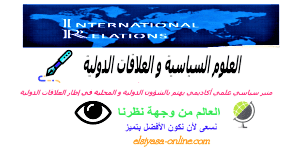Turkish-Israeli Relations under the Perspective of the neo-Ottomanism
 |
| العلاقات التركية - الإسرائيلية من منظور العثمانية الجديدة |
أمال بوساحة / عبد الله راقدي
اهتمت الدراسة بتناول "المقاربة العثمانية الجديدة لتحليل العلاقات التركية الإسرائيلية". خاصة وأنها اتسمت بالمد والجزر منذ الإنفتاح التركي على منطقة الشرق الأوسط في ثمانينات القرن الماضي. لتصل إلى حد قطع العلاقات الدبلوماسية بين الطرفين،ولذلك جاءت المشكلة البحثية للدراسة كما يلي:
كيف أثرت المقاربة العثمانية الجديدة على العلاقات التركية الإسرائيلية؟.
فتكون فرضية الدراسة:
"كلما اتجهت تركيا إلى لعب دور محوري في الشرق الأوسط قائم على الرؤية العثمانية الجديدة،كلما أدى ذلك إلى توتر علاقاتها مع إسرائيل".
خلصت الدراسة إلى أن العلاقات بين البلدين وفق المقاربة العثمانية الجديدة تحكمها البراغماتية والإعتبارات المصلحية لكل من تركيا وإسرائيل.
الكلمات المفتاحية: العثمانية الجديدة ; العمق الاسراتيتيجي ; الشرق الأوسط.
Abstract:
The study focused on examining the Neo- Ottomanism approach to analyzing Turkish-Israeli relations. Especially since it was marked by tides since the Turkish openness to the Middle East in the 1980s.To the extent that the diplomatic relations between the two parties were severed (ruptured),and therefore (accordingly) the research problem of the study came as follows: How did the Neo- Ottomanism approach affect Turkish-Israeli relations? The hypothesis of the study will be: the more Turkey tends to play a pivotal role in the Middle East based on the neo-Ottomanism vision, the more this leads to strained relations with Israel. The study concluded that the relations between the two countries according to the neo- ottomanism approach are governed by pragmatism and interests of both Turkey and Israel.
